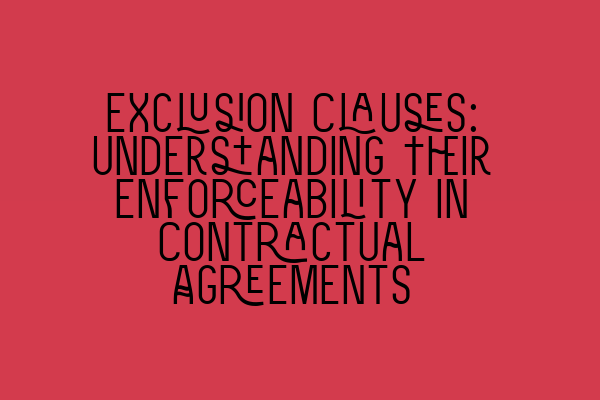Exclusion Clauses: Understanding Their Enforceability in Contractual Agreements
In the realm of contract law, exclusion clauses play a significant role in shaping the rights and obligations of parties involved in a contractual agreement. These clauses, also known as exemption clauses or limitation of liability clauses, are provisions inserted into contracts with the aim of excluding or limiting the liability of one or more parties in the event of a breach or occurrence of certain circumstances.
However, not all exclusion clauses are enforceable, and their enforceability depends on a variety of factors. In this blog post, we will explore the intricacies of exclusion clauses, their enforceability, and the key considerations one should keep in mind while drafting or dealing with such contractual provisions.
Understanding Exclusion Clauses
An exclusion clause is a contractual provision that aims to limit or exclude the liability of one party in certain circumstances. Such clauses are typically inserted into contracts as a means of allocating risk and minimizing potential liability that may arise due to breach of contract, negligence, or other specified events. By including an exclusion clause, parties can essentially define their rights and responsibilities in the event of a breach or occurrence of specified circumstances.
Types of Exclusion Clauses
There are various types of exclusion clauses that can be found in contractual agreements. Some common examples include:
1. Limitation Clauses: These clauses seek to limit the amount of damages that can be claimed by the non-breaching party in the event of a breach.
2. Exemption Clauses: Exemption clauses aim to exclude liability altogether in certain circumstances. They essentially absolve one party from being held responsible for any loss, damage, or injury that may occur.
3. Indemnity Clauses: Indemnity clauses require one party to compensate the other for any losses, damages, or expenses incurred as a result of the specified circumstances.
Enforceability of Exclusion Clauses
While parties may include exclusion clauses in their contracts, it is important to note that not all exclusion clauses are enforceable. The enforceability of an exclusion clause depends on several factors, including:
1. Reasonableness: Under the Unfair Contract Terms Act 1977 and the Consumer Rights Act 2015, exclusion clauses are subject to a “reasonableness” test. This test considers factors such as the bargaining power of the parties, the availability of alternatives, and the nature of the clause itself. If a clause is found to be unreasonable, it may be deemed unenforceable.
2. Incorporation: For an exclusion clause to be enforceable, it must be properly incorporated into the contract. This typically requires the clause to be brought to the attention of the other party before or at the time of entering into the contract. Methods of incorporation can include signatures, notice boards, or prior negotiation.
3. Ambiguity and Contra Proferentem Rule: If an exclusion clause is ambiguous or unclear, courts will interpret it against the party seeking to rely on it. This rule, known as the contra proferentem rule, ensures that any ambiguity is resolved in favor of the party who did not draft the contract.
Best Practices for Drafting Exclusion Clauses
When drafting exclusion clauses, it is essential to consider the following best practices to enhance their enforceability:
1. Clear and Unambiguous Language: The language of an exclusion clause should be clear, concise, and unambiguous. Ambiguity can lead to disputes and may result in the clause being unenforceable.
2. Reasonableness: Ensure that the exclusion clause is reasonable and fair in light of the circumstances. Consider the relative bargaining power of the parties, the nature of the contract, and alternative options available to the non-drafting party.
3. Incorporation and Notice: Clearly bring the existence of the exclusion clause to the attention of the other party. Incorporate the clause into the contract using methods that provide reasonable notice and ensure understanding.
Conclusion
Exclusion clauses are essential contractual provisions that allow parties to limit or exclude liability in certain circumstances. However, their enforceability is subject to various legal considerations, including reasonableness, incorporation, and clarity. By understanding the intricacies of exclusion clauses and applying best practices in their drafting, parties can ensure their enforceability and protect their interests.
If you are preparing for the SQE 1 or SQE 2 exams, be sure to check out our related articles and resources:
– SQE 1 Practice Exam Questions: [link to SQE 1 Practice Exam Questions article](https://fqps.co.uk/sqe/sqe1-preparation/mcq-practice-quiz)
– SQE 1 Practice Mocks FLK1 FLK2: [link to SQE 1 Practice Mocks FLK1 FLK2 article](https://fqps.co.uk/sqe/sqe1-preparation/practice-mocks-quiz)
– SQE 2 Preparation Courses: [link to SQE 2 Preparation Courses article](https://fqps.co.uk/sqe/sqe2-preparation)
– SQE 1 Preparation Courses: [link to SQE 1 Preparation Courses article](https://fqps.co.uk/sqe/sqe1-preparation)
– SRA SQE Exam Dates: [link to SRA SQE Exam Dates article](https://fqps.co.uk/sqe/sqe1-sqe2-exam-dates)
We hope these resources will assist you in your exam preparation journey and provide valuable insights into various aspects of contract law.
